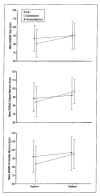Escitalopram and enhancement of cognitive recovery following stroke
- PMID: 20124118
- PMCID: PMC3718472
- DOI: 10.1001/archgenpsychiatry.2009.185
Escitalopram and enhancement of cognitive recovery following stroke
Abstract
Context: Adjunctive restorative therapies administered during the first few months after stroke, the period with the greatest degree of spontaneous recovery, reduce the number of stroke patients with significant disability.
Objective: To examine the effect of escitalopram on cognitive outcome. We hypothesized that patients who received escitalopram would show improved performance in neuropsychological tests assessing memory and executive functions than patients who received placebo or underwent Problem Solving Therapy.
Design: Randomized trial.
Setting: Stroke center.
Participants: One hundred twenty-nine patients were treated within 3 months following stroke. The 12-month trial included 3 arms: a double-blind placebo-controlled comparison of escitalopram (n = 43) with placebo (n = 45), and a nonblinded arm of Problem Solving Therapy (n = 41).
Outcome measures: Change in scores from baseline to the end of treatment for the Repeatable Battery for the Assessment of Neuropsychological Status (RBANS) and Trail-Making, Controlled Oral Word Association, Wechsler Adult Intelligence Scale-III Similarities, and Stroop tests.
Results: We found a difference among the 3 treatment groups in change in RBANS total score (P < .01) and RBANS delayed memory score (P < .01). After adjusting for possible confounders, there was a significant effect of escitalopram treatment on the change in RBANS total score (P < .01, adjusted mean change in score: escitalopram group, 10.0; nonescitalopram group, 3.1) and the change in RBANS delayed memory score (P < .01, adjusted mean change in score: escitalopram group, 11.3; nonescitalopram group, 2.5). We did not observe treatment effects in other neuropsychological measures.
Conclusions: When compared with patients who received placebo or underwent Problem Solving Therapy, stroke patients who received escitalopram showed improvement in global cognitive functioning, specifically in verbal and visual memory functions. This beneficial effect of escitalopram was independent of its effect on depression. The utility of antidepressants in the process of poststroke recovery should be further investigated. Trial Registration clinicaltrials.gov Identifier: NCT00071643.
Figures
References
-
- Mackay J, et al. The Atlas of Heart Disease and Stroke. Switzerland: World Health Organization; Geneva: 2004.
-
- Rosamond W, Flegal K, Furie K, Go A, Greenlund K, Haase N, Hallpem SM, Ho M, Howard V, Kissela B, Kittner S, Lloyd-Jones D, McDermott M, Meigs J, Moy C, Nichol G, O’Donnell C, Roger V, Sorlie P, Steinberger J, Thom T, Wilson M, Hong Y. American Heart Association Statistics Committee and Stroke Statistics Subcommittee. Heart disease and stroke statistics–2008 update: a report from the American Heart Association Statistics Committee and Stroke Statistics Subcommittee. Circulation. 2008;117(4):e25–e146. - PubMed
-
- Klijn CJ, Hankey GJ. American Stroke Association and European Stroke Initiative. Management of acute ischaemic stroke: new guidelines from the American Stroke Association and European Stroke Initiative. Lancet Neurol. 2003;2(11):698–701. - PubMed
-
- Norrving B, Adams RJ. Organized stroke care. Stroke. 2006;37(2):326–32B. - PubMed
-
- Leira EC, Adams HP., Jr Management of acute ischemic stroke. Clin Geriatr Med. 1999;15(4):701–720. - PubMed



